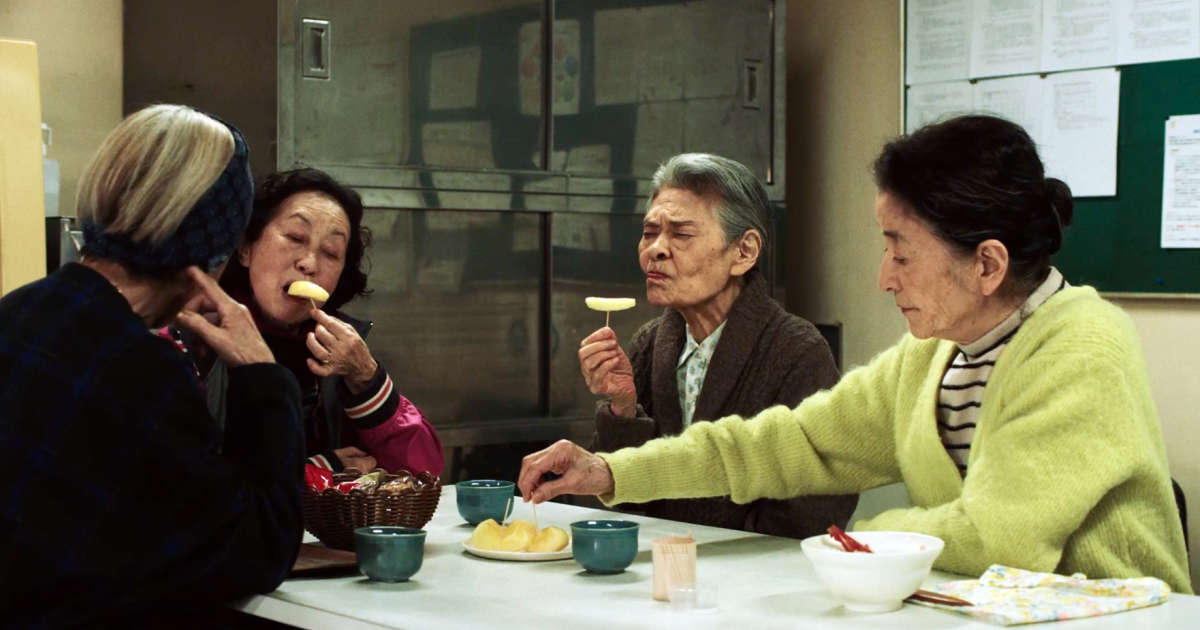I can’t imagine a scenario in which a dystopian film about government sponsored euthanasia of elderly citizens could be translated successfully to the North American context. Part of what makes the best dystopias work is a root in some truth, in some deep-seated cultural anxiety, and that dystopia is more or less unimaginable—especially with the conceit of the euthanasia being perceived as an act of patriotism. And that’s the premise of Plan 75, a Japanese film screened at the MFA as part of the Boston Festival of Films From Japan.
Ritual suicide for the country, or mass seppuku, and a rapidly aging population are very much topical issues in Japan. Plan 75, directed by Chie Hayakawa, creates a dystopia that apart from a free government sponsored euthanasia welfare plan for citizens above the age of 75 is fully recognizable as contemporary Japan. Nearing economic collapse because of the country’s unbelievably low replacement rate, the government even incentivizes citizens with a laughable $1,000 “preparing grant” to do with what they will before their day comes—a not so subtle indication of what socio-economic bracket the government hopes will participate.
The film, an extension of a 2018 short film by Hayakawa, uses three different windows into the policy. Michi (Chieko Baisho) is a poor and elderly woman unable to find an employer willing to take the risk, and she finds some solace and desperately needed good company in the weekly phone calls from her Plan 75 worker. Maria (Stefanie Arianne), a church-going Filipino immigrant, finds good-paying work as a corpse liaison: she undresses, removes belongings, and prepares the corpses for cremation. Hiromu (Hayato Isomura) also works for Plan 75 but has a more corporate oriented role and is emotionally compromised when his uncle, on his 75th birthday, shows up at his office. The three meet only once.
The unraveling of each of the three subjects says the quiet part out loud—and this is the closest Hayakawa and co-writer Jason Gray ever get to verbalizing against the dystopian tirade and economic gerontophobia of the intellectual elites and governmental authorities. Their dystopia has more in common with Hirokazu Kore-eda’s anti-supernaturalist After Life (1998), where after-life spiritual affairs resemble mundane corporate interviews, than it does with traditional high-energy authoritarian dystopias like The Handmaid’s Tale or The Hunger Games. The production designer, Setsuko Shiokawa, appears to have an easy task: find real places to shoot and don’t change a damn thing.
The pacified approach to dystopia from Hayakawa feels proper for Plan 75. For Hayakawa and her crew, there’s no room for bombastic politicization or loud resistance. As far as we know, there was never any alternative and Plan 75 has been a huge success. (The government is apparently considering dropping the age requirement to 65.) Protestors, if they are any, are out of sight and out of mind. No one in the world of Plan 75 has any ideological qualms with the euthanasia plan. But thanks to the screenplay’s pacified approach, by the end, all three of the film’s subjects find themselves moved to a point of resistance, however small, not by ideology or politics but by fellow humans.
Plan 75
2022
dir. Chie Hayakawa
113 min.
Screened Saturday, 5/13 @ Museum of Fine Arts Boston
Part of the Boston Festival of Films from Japan, which continues through 5/20


